Grading Trump's First 100 Days in Office: A Science Report Card
First 100 days
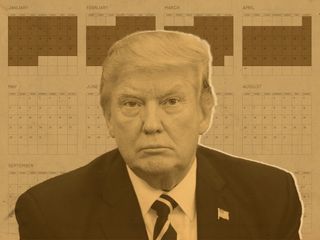
President Donald Trump will mark 100 days in office on April 29, and though it is still early on in his administration, he has enacted policies or signaled his stance on a variety of science issues, ranging from climate change to space exploration.
We reached out to experts across different fields and asked them to grade President Trump's performance in his first 100 days in office. Here is his report card when it comes to science issues.
Climate change
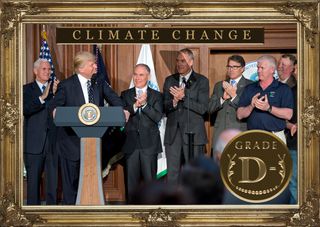
Before he became president, Donald Trump's views on climate change flip-flopped.
In 2009, Trump and three of his children — Ivanka, Donald Jr. and Eric — signed an advertisement in The New York Times to say they "supported meaningful and effective measures… to fight climate change," which they called "scientifically irrefutable."
However, in 2012, he tweeted that global warming is a Chinese hoax concocted "in order to make U.S. manufacturing non-competitive."
These days, Trump's actions toward addressing climate change aren't promising. "Since becoming president, I don't think he's ever addressed the [climate change] issue directly — but the nature of his appointees says a lot," said Pushker Kharecha, a climate scientist at the Earth Institute at Columbia University in New York.
For instance, Trump appointed Scott Pruitt to the Environmental Protection Agency and Rick Perry to the Department of Energy, "two well-known climate change deniers [or] minimizers," Kharecha told Live Science.
"And the proposed White House budget, if accepted by Congress, would disproportionately slash funding for key federal Earth science research programs," Kharecha said. Trump also signed an executive order that would roll back the Clean Power Plan, a regulation designed to reduce greenhouse gas emissions, which contribute to climate change.
"To put this into context, all of this is happening at a time when essentially the entire rest of the world recognizes that not only is human-caused climate change very real, it's reaching crisis-level urgency," Kharecha said.
Because Trump and his administration haven't properly acknowledged the reality that climate change is primarily caused by humans, "much less said or done anything to address it, I give him a big "F" on this issue," Kharecha said.
Trump also scored an "F" from Edward Rubin, a professor of engineering, public policy and mechanical engineering at Carnegie Mellon University in Pittsburgh. "The science clearly shows that sustained actions are needed now to significantly reduce greenhouse gas emissions," Rubin said. "U.S. leadership is critical to the global effort. The president’s policies are opposite to what the science compels."
Trump earned a "D" from Michael Mann, a distinguished professor of meteorology at Pennsylvania State University. "[But] that’s only because the term isn’t over," Mann told Live Science in an email. "He’d have to ace the final (demonstrating a real recognition of the scientific evidence and its implications) to avoid an 'F.'"
—Reporting by Laura Geggel, Senior Writer
Coal
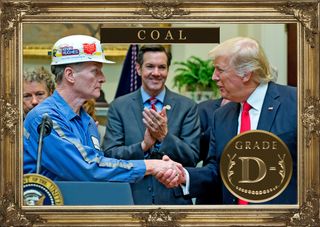
Trump has promoted coal energy and coal mining jobs above other cleaner energy sources, leading scientists interviewed by Live Science to give him failing grades in this sector.
"Basic science tells us that coal is by far the dirtiest fuel in terms of both greenhouse gas emissions and fatal air pollutants," Pushker Kharecha, a climate scientist at the Earth Institute at Columbia University in New York City, told Live Science. "To knowingly promote such an energy source is a big step backward."
Electricity generation is associated with the premature deaths of more than 50,000 people every year in the United States, according to a 2013 study published in the journal Atmospheric Environment. "We can safely say that most of these deaths are due to coal burning, since it produces most of the fatal pollutants in this sector," Kharecha said.
Moreover, while Trump talked about clean coal during the second presidential debate, the United States has only one coal power plant equipped with carbon capture and storage, a mechanism that captures coal pollutants before they enter the atmosphere, he said. The plant, located in Texas, opened in January 2017, so it's too soon to say whether it will be a successful clean power plant, Kharecha said.
On March 28, Trump signed an executive order to dismantle the Clean Power Plan, which would have pushed the national away from burning coal and toward cleaner energy sources such as natural gas and even renewables like wind and solar. Even so, this coal-energy boost may be short-lived, experts said. Since the early 2000s, natural gas has produced a growing percentage of the country's energy generation, and in 2016 natural gas produced more energy than coal did, according to the U.S. Energy Information Administration. Natural gas is less expensive than coal, and is expected to surpass it in the long run.
"Either knowingly or unwittingly, Trump has been selling false promises to 'coal country,' saying he'll bring their jobs back," Kharecha said. "However, it's very unlikely that coal will make a major comeback anytime soon."
For these reasons, Kharecha gave Trump an "F" on coal.
Edward Rubin, a professor of engineering, public policy and mechanical engineering at Carnegie Mellon University in Pittsburgh, also failed Trump in coal science. Rubin noted that Trump approved legislation that did away with an Obama administration regulation protecting waterways from coal mining waste.
"The physical and environmental sciences say it’s not good to dump coal mining wastes into rivers and streams, and to continue emitting air pollutants, including carbon dioxide," Rubin said. "The social sciences say it’s not good to give coal miners the false hope that jobs lost due to the market forces of automation and competition from cheaper energy sources will magically return."
Michael Mann, a distinguished professor of meteorology at Pennsylvania State University, gave Trump a "D" in coal science.
"There is still time to turn things around," Mann said Live Science in an email. "If he cared about coal workers (rather than the profits of his coal baron friends), he would institute job training programs to help coal workers, their families and communities transition from a relict profession that has no future."
—Reporting by Laura Geggel, Senior Writer
Health care
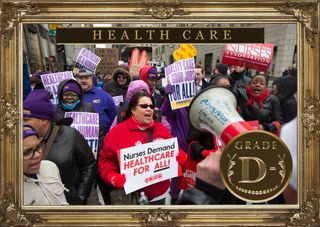
When Trump took office, he vowed to repeal and replace the Affordable Care Act (dubbed Obamacare) in his first 100 days in office. So far, he has fallen far short of that goal. Trump supported a "repeal and replace" bill so broadly unpopular that it did not pass out of a Republican-controlled Congress, and was supported by only 17 percent of the public in a Quinnipiac poll leading up to the vote. The bill died before a vote was called.
Trump's lack of interest in or expertise in health care policy, along with his willingness to hand the process over to Paul Ryan, Speaker of the U.S. House of Representatives, clearly hindered his ability to pass a replacement bill, said Mark Peterson, a health care expert and chair of the Department of Public Policy at the University of California, Los Angeles (UCLA).
"Frankly, it was quite astonishing that he would say, as he did on Feb. 27, that 'Nobody knew health care could be so complicated,'" Peterson, who gave Trump a "D" on the issue, told Live Science. "Any sentient individual who had any exposure to the health care system in the U.S. and legislative efforts to grapple with it knows immediately how complicated it is."
However, Trump's efforts were also impeded by the Republican Congress mishandling the legislative process, Peterson added.
Another expert, Gerald F. Kominski, a professor in the Department of Health Policy and Management at UCLA, gave Trump failing grades.
"Trump has done nothing of substance on health care," Kominski said.
Even if Trump had managed to usher the Republican bill through Congress, it would have fallen far short of the promises he made on the campaign trail, said David Cutler, an economics professor at Harvard University who was President Barack Obama's senior health care advisor during his campaign.
Trump promised a plan "that would be 'more, better, and cheaper,'" said Cutler, who stated that Trump deserves an "F" on the issue.
Instead, Trump never introduced a new plan, backed one that would deprive at least 20 million people of coverage and raise prices for others, Cutler and Peterson said, adding that he hasn't followed through on controlling drug costs and is now threatening to allow the health care exchange markets to fall apart.
Of course, 100 days is not enough time to measure accomplishments, Peterson added. But so far, "health care has been a bust for the president," Peterson said.
Republicans are now considering putting forward an amendment to their original bill that would allow states to opt out of Obamacare requirements to cover people with preexisting conditions without charging exorbitant rates. (Members of Congress and their aides would be exempt from these waivers under the new amendment.)
Michael Cannon, director of health policy studies at the Cato Institute, a libertarian think tank headquartered in Washington, D.C., also panned Trump's efforts on health care, giving the president an "F" on the issue.
"He has completely abandoned his pledge to repeal Obamacare, and also his pledge to replace Obamacare with health savings accounts," Cannon told Live Science.
—Reporting by Tia Ghose, Senior Writer
Opioids
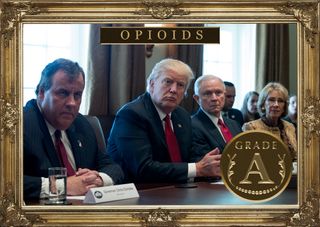
During his 2016 presidential campaign, then-candidate Trump vowed to address the country's opioid epidemic. However, as president, Trump has taken steps to address this issue only in recent weeks.
In 2015, there were more than 33,000 opioid overdose deaths in the United States from drugs such as prescription painkillers and heroin, according to the Centers for Disease Control and Prevention (CDC).
On March 29, 2017, Trump signed an executive order that created a presidential commission to combat the crisis, according to PBS. Later, in April, the administration awarded grants to states to help fight opioid addiction, according to the Department of Health and Human Services (HHS).
HHS has prioritized five strategies in the department's efforts to address opioid addiction: "strengthening public health surveillance, advancing the practice of pain management, improving access to treatment and recovery services, targeting availability and distribution of overdose-reversing drugs, and supporting cutting-edge research."
The funds that the Trump administration has awarded to the states were initially allocated by President Barack Obama's administration as a part of the 21st Century Cures Act, said Dr. David Fiellin, a professor of medicine and public health at Yale University School of Medicine in Connecticut.
Awarding grants to states to help combat the escalating opioid crisis is "an excellent first step," said Dr. Gail D'Onofrio, chair of the Department of Emergency Medicine, also at Yale University. D'Onofrio noted that she is happy that the funds first allocated by the Obama administration are being distributed by the current administration. [America's Opioid-Use Epidemic: 5 Startling Facts]
In addition, HHS's priorities are consistent with the initiatives outlined in Connecticut, D'Onofrio told Live Science. Connecticut was one of the 19 states that experienced a significant increase in opioid overdose deaths from 2014 to 2015, according to the CDC. In 2015, there were 800 opioid overdose deaths in the state.
Asked to grade the Trump administration's efforts thus far, D'Onofrio said, "I would give it an 'A' for beginning."
—Reporting by Sara Miller, Staff Writer
Space
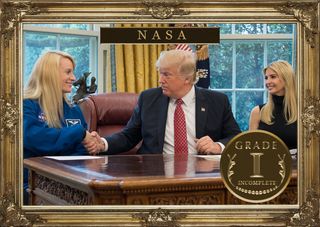
We still don't know a lot about President Trump's plans for exploring the final frontier.
Though the president has made aggressive moves in high-profile areas such as tax reform, immigration and health care during his first 100 days in office, he hasn't done much yet in the space-policy realm. So, it's probably premature to assess his ideas on space right now, no matter what your political leanings might be, according to experts.
"I think 'incomplete' is the right grade," said John Logsdon, a professor emeritus of political science and international affairs at George Washington University's Elliott School of International Affairs in Washington, D.C. "There haven't been any substantive actions of any significance, unless you count the budget." [Presidential Visions for NASA Throughout History]
That 2018 federal budget request, released in March, does hold some clues about the president's presumed priorities. For example, the request eliminates funding for NASA's proposed asteroid-capture mission, and it cuts four NASA Earth science missions. Then there's the agency's "top line."
The Trump administration requested $19.1 billion for NASA — a decrease of 0.8 percent from 2017 space-spending levels. For space fans, that's an encouragingly modest drop, considering how deeply some other agencies were cut. For example, the proposed budget would slash funding for the National Institutes of Health and the Environmental Protection Agency by 18 percent and 31 percent, respectively.
"The signs so far, I think, have actually been good," Scott Pace, director of the Space Policy Institute at George Washington University, told Live Science. "Given all the other cuts in non-defense discretionary [spending]," he added, NASA's "top line survived pretty well."
Logsdon agreed with that general assessment.
"Every indication is that Trump is going to be good for the space program," he told Live Science. "The specifics of 'good,' and in what ways, are to be determined. But he hasn't said a negative thing yet."
The president seems engaged on space, at least on some level, both Logsdon and Pace said. Logsdon noted that Trump didn't appear to be reading from a script during the signing ceremony for a NASA authorization act last month. (This bill, which is now law, covers fiscal year 2017. It is different than the 2018 budget request, which must still work its way through Congress.)
And Pace pointed out that the president has publicly discussed space several times recently. During Trump's weekly address on March 25, for example, he celebrated the achievements of NASA's Hubble Space Telescope and voiced enthusiasm for its successor, the $8.8 billion James Webb Space Telescope, which is scheduled to launch in late 2018.
And on April 24, the president held a video call with record-breaking astronaut Peggy Whitson and her NASA colleague Jack Fischer, who are currently aboard the International Space Station. (In this vein: The fact that Trump has yet to nominate a NASA administrator is not an indication that he doesn't care about the space program, both Logsdon and Pace said. New presidents often wait several months before choosing a NASA chief.)
Still, details about the new administration's planned space policy remain hard to come by. The clues thus far point to the Trump White House prioritizing human spaceflight and "other space activities with broad public impact," Logsdon said. "And he seems interested in Mars."
Indeed, President Trump has repeatedly voiced support for crewed missions to the Red Planet, even telling Whitson during their chat that he'd like that milestone to occur while he's in the White House.
"I think he sees space as part of the American image, and as both a symbol and a practical representation of national power," Pace said. "And he'd like to see achievements happen on his watch."
President Trump and his team could also push for returning people to the moon, Pace added.
"I don't know whether moon or Mars — technical differences like that — really matter," he said. "Obviously it matters to the space community, but at the political level, [Trump administration officials] want to see things moving, and want to see them happen sooner rather than later, and on his watch."
Any discussion of a new president's first 100 days in office must come with a big disclaimer, of course: It's still very early days, and things could change dramatically.
"One hundred days is an arbitrary number," Logsdon said. "By 150 days, Kennedy had decided to send us to the moon."
—Reporting by Mike Wall, Senior Writer
Endangered species

To date, the Trump administration has had little interaction with the Endangered Species Act (ESA). But, its actions to roll back environmental regulations and protections on federal lands put greater pressure on wildlife that are already susceptible to decline, experts say. And proposed budget cuts to the Department of the Interior — a reduction of about 12 percent — would hamper the ESA's ability to protect listed species and to identify species that are in trouble, conservationists told Live Science.
The ESA was signed into law in 1973, and exists to safeguard vulnerable species and ecosystems — on land, in the oceans and in freshwater habitats. A species can be designated under the ESA as "endangered," at risk of extinction in all or part of its range, or "threatened," meaning under threat of becoming endangered. Once a species is listed, it is illegal for it to be hunted, harassed or harmed in any way, and additional protections extend to preserve its habitats from destruction, according to a summary published online by the U.S. Fish and Wildlife Service (FWS)
Trump has yet to appoint a new director for the FWS — the organization that holds most of the responsibility for managing the ESA. And the president's vocal support of fossil fuel extraction and his dismissal of climate science do not bode well for endangered and threatened species, said Bob Dreher, senior vice president for Conservation Programs at Defenders of Wildlife, a nonprofit conservation organization based in Washington, D.C.
"We have reasons for very deep concern about whether this administration will fulfill their responsibilities for protection of imperiled wildlife and sound management of federal public lands," Dreher, who gave Trump an "incomplete" grade on the issue, told Live Science in an email.
The Trump administration clashed with the ESA in February, when it delayed the endangered classification of a bumblebee species. The rusty patched bumblebee (Bombus affinis) — which declined by 87 percent over the past 20 years — was listed as endangered in President Barack Obama's last days in office, and protections were to go into effect Feb. 10. However, the Trump administration called for further review of the bee's status in response to objections from industrial and agricultural groups, Time reported.
This challenge to a classification that had already been meticulously reviewed and approved was "completely illegal," Rebecca Riley, a senior attorney for the Land and Wildlife Program at the Natural Resources Defense Council (NRDC), told Live Science. The NRDC swiftly countered by filing a lawsuit.
"The Obama administration made the decision to protect the species based on extensive science — there was no basis on which to reverse it," said Riley, who stated that Trump deserves an "F" on the issue of protecting endangered species.
The bees received their endangered status March 21, but other actions on the part of the Trump administration are raising additional red flags for conservation groups. Trump's call to eliminate the 2015 Clean Water Rule, which defines federal oversight for small bodies of water in order to regulate pollution, could dramatically impact numerous freshwater species, Collin O'Mara, president and CEO of the National Wildlife Federation, told Live Science.
"One-third of all freshwater fish and two-thirds of all bivalves — mussels and oysters — are at risk of potential extinction in the coming decade. When you walk back from a rule that's going to improve water quality and stream health, you're making it that much harder for those species to recover," O'Mara said.
Trump also issued an executive order overturning an Obama-era ban on lead ammunition and tackle in national wildlife refuges, despite ample evidence that their use leaves behind toxic residue that can harm predators and scavengers, said Noah Greenwald, director of the Endangered Species Program at the Center for Biological Diversity. Bald eagles, in particular, are especially prone to lead poisoning, Greenwald told Live Science.
Another Obama-era ruling that Trump overturned during his first 100 days banned certain practices for hunting large predators — such as wolves and bears — on federal lands in Alaska. Evidence shows that killing top predators carries negative consequences for entire ecosystems and affects multiple species, yet Congress and the Trump administration proceeded with their reversal, said Greenwald, who gave Trump an "F" on the issue.
"It's clear they're not prioritizing the issue — if anything, they're hostile to wildlife and endangered species," Greenwald said.
It remains to be seen whether the coming months will bring new efforts on the part of the Trump administration to follow up on campaign rhetoric praising the preservation of public lands. But, their actions thus far offer little hope that the welfare of endangered species will rank high on their list, experts say.
"At this time the jury's still out," O'Mara, who gave Trump an "incomplete" grade, told Live Science. "But there have not been many positive actions yet that would help the recovery of thousands of species that are in trouble right now."
—Reporting by Mindy Weisberger, Senior Writer
Women's health

The Trump administration has made a number of policy changes that could have a harmful impact on women's health, according to experts.
"President Trump's first 100 days can be described as an all-out assault on women's health and reproductive rights," said Jamila K. Taylor, a senior fellow at the Center for American Progress, a progressive policy institute.
One of Trump's first executive orders was to reinstate the Global Gag Rule, a policy that bans federal funding to international organizations if they offer abortion-related services or information, even if those organizations use private funds, Taylor told Live Science. Every Republican president since Ronald Regan has reinstated the ban, but under the Trump administration, the ban goes farther than before because it now applies to all U.S. global health funding, whereas in the past, it applied just to family planning funding.
"Research has shown that the Global Gag Rule places undue burden on U.S.-funded health care providers and women seeking their services," Taylor said. According to Population Action International, a research and advocacy group that works to improve access to reproductive health care, the policy has, in the past, led to clinic closures and reduced services by international family planning providers, and decreased supplies of contraceptives.
"Cutting funds to providers working on the front lines of hard-to-reach communities has led to entire health care networks collapsing, the most vulnerable women having to go without access to life-saving services, and the denial of women's fundamental human rights," said Taylor, who gave Trump an "F" for women's health issues in his first 100 days in office.
Trump also recently signed a bill that allows states to stop "Title X" funding for Planned Parenthood and other agencies that offer abortions. Providers that use Title X funds serve about 4 million people with preventive health care each year, Taylor said.
Trump's replacement to the Affordable Care Act could also restrict private insurance coverage of abortions, prevent Medicaid enrollees from having access to Planned Parenthood and get rid of maternity care health benefits, Taylor said.
Jill Horwitz, a professor of law and a health policy expert at the University of California, Los Angeles School of Law, also gave the Trump administration a failing grade on this issue, citing the proposed changes to the Affordable Care Act. The proposed reforms "have disregarded the health of women," Horwitz said. "For example, the second reform proposal would eliminate essential health benefits, including maternity care. This disregard is not only a problem for health care but the financial stability of women and their families."
—Reporting by Rachael Rettner, Senior Writer
Oil

One of the top issues being taken on by the Trump administration is energy — specifically energy security, according to the White House website. The president's "America First Energy Plan" outlines the elimination of clean energy policies established under President Obama's administration, and highlights investments in fossil fuels (oil, natural gas and coal).
Though the plan itself is vague in what actions the administration will take, the first 100 days of Trump's presidency have already seen a revival of domestic oil projects. Most notably, the president signed executive orders just days after his inauguration to advance construction of the Keystone XL and Dakota Access Pipeline projects.
The proposed Dakota Access Pipeline would travel 1,172 miles (1,886 kilometers) through North Dakota, South Dakota, Iowa and Illinois, to transport up to 570,000 barrels of crude oil per day. The project was stalled in December 2016 due to concerns of its environmental impact and potential contamination of water supplies along the pipeline's route, which includes passing through sacred land of the Native American tribe Standing Rock Sioux.
The Keystone XL pipeline would transport about 830,000 barrels of tar sands oil (a mixture of clay, sand, water and thick, black oil) per day from Canada to the Texas Gulf Coast, extending 1,179 miles (1,897 km). Obama halted construction of the pipeline in 2015, saying the Keystone pipeline would reinforce reliance on fossil fuels.
The Keystone XL pipeline would also have a dire impact on climate change, according to climate scientist Michael Mann, a distinguished professor of meteorology at Pennsylvania State University, who gave Trump a "D" on the issue.
"[Keystone would] unleash huge amounts of the dirtiest, most carbon-costly oil into the global marketplace at a time when we need to leave the vast majority of oil reserves in the ground if we're going to avoid dangerous and irreversible climate change," Mann told Live Science.
In fact, the [Keystone] XL pipeline project could release greenhouse gases every year that would equal the annual output of 5.7 million cars on the road, according to a 2015 report by the Environmental Protection Agency (EPA).
Trump's oil-friendly policies could also damage ongoing efforts to reduce demand for oil, according to Jeremy Martin, a senior scientist and fuels lead for the Clean Vehicles Program at the Union of Concerned Scientists, a nonprofit science advocacy organization headquartered in Cambridge, Massachusetts.
"By focusing on only half the equation, his strategies miss the bigger opportunities to cut oil use and are doomed to fail," Martin, who said Trump deserves an "F" on the issue, told Live Science. "He's pushed for more pipelines without fully analyzing the impacts on the communities they'd run through and the alternatives … ignoring the fact that oil is the largest source of [carbon dioxide] emissions responsible for climate change."
An energy strategy that targets reducing fossil fuel consumption and focuses on clean technology would be more effective, Martin said.
—Reporting by Kacey Deamer, Staff Writer
Sign up for the Live Science daily newsletter now
Get the world’s most fascinating discoveries delivered straight to your inbox.
